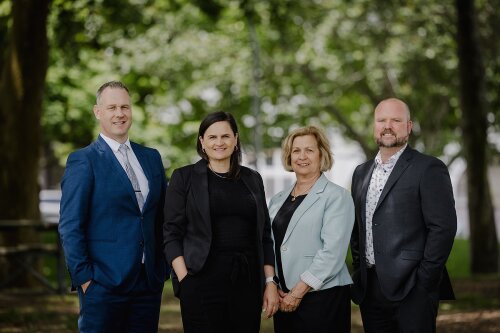Best Gaming Lawyers in Cambridge
Share your needs with us, get contacted by law firms.
Free. Takes 2 min.
List of the best lawyers in Cambridge, New Zealand
1. About Gaming Law in Cambridge, New Zealand
Gaming law in Cambridge operates within New Zealand's national framework. The key statute is the Gambling Act 2003, which governs most forms of gambling across the country. Licensing, compliance, and enforcement duties are carried out primarily by the Department of Internal Affairs (DIA). Gambling Act 2003 sets the rules for casinos, racing, and gaming machines at venues in Cambridge and throughout New Zealand.
Cambridge residents and venue operators should also be aware of local government oversight. Waipā District Council administers district policies that influence where gaming machines may be located and how venues operate within the district. These local policies work in tandem with national law to shape the gaming landscape in Cambridge.
Gambling in New Zealand is regulated by the Gambling Act 2003 and overseen by the Department of Internal Affairs.Department of Internal Affairs
2. Why You May Need a Lawyer
Legal help is often essential if you are involved in Cambridge gaming activities. Here are concrete scenarios you might face:
- You operate a cafe or pub in Cambridge and want to apply for a new Class 4 gaming machine licence or renew an existing one. A lawyer can help prepare the application, gather required documents, and respond to DIA requests.
- You suspect that a nearby venue is breaching licence conditions or local policies. A solicitor can advise on enforcement steps, evidence collection, and potential remedies.
- Your licence is suspended, modified, or revoked by the DIA or Waipā District Council. A lawyer can guide you through the appeal or review process and represent you in hearings.
- You are negotiating a contract with a gaming operator or venue owner. A lawyer can review terms, conditions, and compliance requirements to protect your rights and minimize liability.
- You want to contest a local policy decision that limits gaming machine numbers or imposes operating restrictions in Cambridge. A solicitor can help with submissions and appeals to the council or to the courts.
- You are a venue owner and need compliance advice on advertising, responsible gaming measures, and harm minimization requirements mandated by the DIA and local policy.
3. Local Laws Overview
The Cambridge gaming framework rests on three key areas: national legislation, national regulations, and local policies.
- Gambling Act 2003 - The primary national law governing most gambling activities in New Zealand. It establishes licensing regimes, eligibility criteria, and enforcement powers for operators and venues. See Gambling Act 2003.
- Gambling Regulations 2004 - The secondary rules that detail licensing processes, application forms, fees, and compliance expectations for gambling activities. See Gambling Regulations 2004.
- Waipā District Council Gambling Venues Policy - Local policy shaping where gaming machines may be located and how venues operate within Cambridge’s Waikato district. For local policy information, visit the council's official site: Waipā District Council.
In addition to these laws, local rules may reference harm minimization and advertising standards. Operators and players should stay updated with DIA guidance and council notices, as policies can change to address community concerns.
4. Frequently Asked Questions
What is the Gambling Act 2003 and how does it affect Cambridge venues?
The Gambling Act 2003 sets licensing rules for casinos and venues with gaming machines. It defines who may operate, how licences are applied for, and what conditions apply. Cambridge venues must comply with these provisions and any local Waipā policies.
How do I apply for a Class 4 gaming machine license in Cambridge?
Applications are submitted to the DIA with required documents and local approvals. A solicitor or legal counsel can help prepare the file, ensure compliance, and respond to requests during processing.
What are the licensing requirements for a gaming venue in Waipā District?
Requirements include meeting national licensing standards under the Gambling Act 2003 and adhering to Waipā District Council policies. A legal adviser can map out steps and coordinate with council and DIA.
How long does a license decision typically take in New Zealand?
Processing times vary by licence type and completeness of the application. Plan for several months for new licences and shorter periods for renewals, with possible delays for public submissions or additional information requests.
Do I need a solicitor to handle licensing in Cambridge?
While not mandatory, a solicitor or licensed solicitor can improve accuracy, reduce errors, and speed up communications with the DIA and council during complex applications or enforcement matters.
Can I appeal a DIA decision about a gaming licence?
Yes, there are avenues to challenge a decision, including internal reviews or formal appeals. A lawyer can assess eligibility and guide you through the process.
Should I involve a local councillor in a policy dispute about gaming venues?
Involving council branches through official submissions is common. A lawyer can help prepare submissions that align with Waipā policies and statutory timelines.
What are the penalties for illegal gaming in Cambridge?
Penalties may include fines, licence suspensions, or criminal charges depending on the violation. The DIA enforces compliance and local councils may also take action.
How much do licensing fees cost for gaming venues in New Zealand?
Fees vary by licence type, venue size, and location. For precise amounts, check the DIA fee schedule and any Waipā District Council charges.
Is online gambling regulated in New Zealand and how does it relate to Cambridge?
Online gambling is regulated under the same national framework. Operators must be licensed, and consumer protections apply regardless of where players are located in New Zealand.
Where can I report suspicious gaming activity in Cambridge?
Report concerns to the Department of Internal Affairs or the local council. Early reporting can help with enforcement and harm minimization measures.
Do I need to disclose conflicts of interest when applying for gaming licenses?
Yes. Full disclosure is typically required to avoid disqualifications and ensure transparent decision making during licensing and enforcement processes.
What is the process to renew a gaming machine licence?
Renewals follow a similar workflow to initial applications, including submission of updated information and possible public submissions. Timelines vary by case.
5. Additional Resources
- Department of Internal Affairs (Gambling licensing and enforcement)
- Gambling Act 2003 - Legislation NZ
- Waipā District Council
6. Next Steps
- Define your gaming objective in Cambridge and identify whether you are a venue operator, resident, or both.
- Gather existing documents such as licence paperwork, council notices, and any correspondence from the DIA.
- Check the DIA website and Waipā District Council policies to understand local requirements.
- Schedule a consultation with a solicitor who specialises in gaming law in Cambridge or the Waikato region.
- Prepare a tailored plan with your lawyer, including a timeline and milestones for applications or appeals.
- Submit the required licence applications and respond promptly to any requests for information.
- Review decisions with your lawyer and pursue appeals or enforcement actions if needed, following official timelines.
Lawzana helps you find the best lawyers and law firms in Cambridge through a curated and pre-screened list of qualified legal professionals. Our platform offers rankings and detailed profiles of attorneys and law firms, allowing you to compare based on practice areas, including Gaming, experience, and client feedback.
Each profile includes a description of the firm's areas of practice, client reviews, team members and partners, year of establishment, spoken languages, office locations, contact information, social media presence, and any published articles or resources. Most firms on our platform speak English and are experienced in both local and international legal matters.
Get a quote from top-rated law firms in Cambridge, New Zealand — quickly, securely, and without unnecessary hassle.
Disclaimer:
The information provided on this page is for general informational purposes only and does not constitute legal advice. While we strive to ensure the accuracy and relevance of the content, legal information may change over time, and interpretations of the law can vary. You should always consult with a qualified legal professional for advice specific to your situation.
We disclaim all liability for actions taken or not taken based on the content of this page. If you believe any information is incorrect or outdated, please contact us, and we will review and update it where appropriate.









